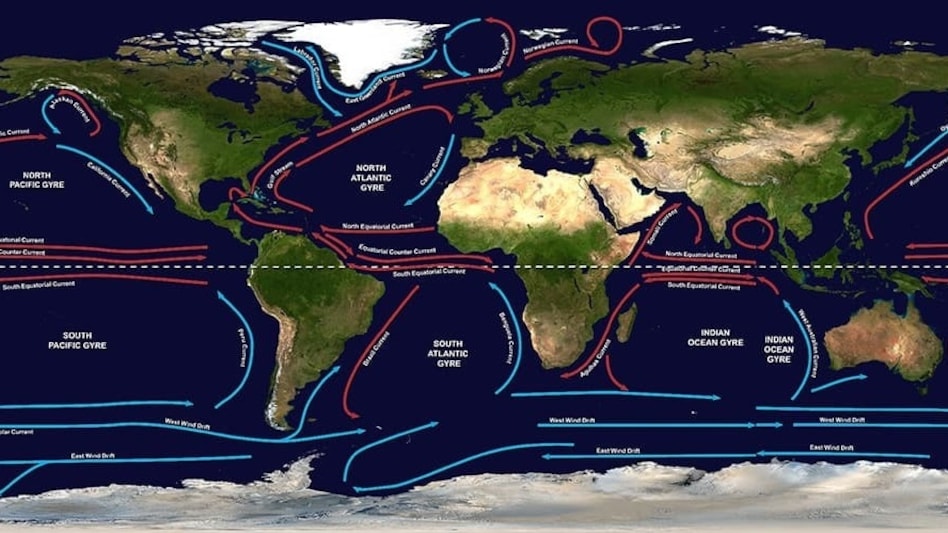 Climate models predict that if greenhouse gas emissions persist at current levels, the AMOC could weaken by 30–50% by the end of the century, resulting in altered weather patterns, increased extreme weather events in Europe. (Photo credit: NOAA)
Climate models predict that if greenhouse gas emissions persist at current levels, the AMOC could weaken by 30–50% by the end of the century, resulting in altered weather patterns, increased extreme weather events in Europe. (Photo credit: NOAA) 
 Climate models predict that if greenhouse gas emissions persist at current levels, the AMOC could weaken by 30–50% by the end of the century, resulting in altered weather patterns, increased extreme weather events in Europe. (Photo credit: NOAA)
Climate models predict that if greenhouse gas emissions persist at current levels, the AMOC could weaken by 30–50% by the end of the century, resulting in altered weather patterns, increased extreme weather events in Europe. (Photo credit: NOAA) Leading scientists have urged policymakers to take action on the potentially imminent and ‘devastating’ collapse of crucial Atlantic Ocean currents.
In an open letter published on October 21, climatologist Michael Mann from the University of Pennsylvania and other experts assert that the risks associated with the weakening of ocean circulation in the Atlantic have been significantly underestimated and require urgent attention.
The focus is on the Atlantic Meridional Overturning Circulation (AMOC), a vital ocean conveyor belt that includes the Gulf Stream and transports essential heat to the Northern Hemisphere. Research indicates that the AMOC is slowing down and may soon reach a tipping point due to global warming, potentially destabilising Earth’s climate.
Often referred to as “the great ocean conveyor”, the AMOC is a vast system of currents that carries warm, salty water from the tropics northward into the North Atlantic. There, the water cools, becomes denser, and sinks before flowing back south at deeper levels, eventually rising to the surface throughout the ocean, creating a continuous circulation loop.
This system is responsible for transporting a significant portion of heat into the Northern Hemisphere — about 25 percent of the total heat transferred by the ocean and atmosphere. It plays a crucial role in moderating the climate of Northwest Europe, helping prevent Arctic sea ice from extending beyond Norway.
If the AMOC continues to weaken, it could cool the northern hemisphere, shifting global climate belts, including the equatorial rainfall belt, further south. This disruption could have serious implications for agriculture in Northwestern Europe and beyond.
Climate models predict that if greenhouse gas emissions persist at current levels, the AMOC could weaken by 30–50 percent by the end of the century, resulting in altered weather patterns, increased extreme weather events in Europe, and changes in tropical rainfall that could lead to droughts or floods.
Additionally, regions, particularly the US eastern seaboard, could experience accelerated sea level rise of several tens of centimeters.
A more alarming scenario involves the AMOC potentially switching from a strong to a very weak state — or even shutting down — within decades, even with minimal climate warming. This phenomenon, known as a tipping point, could trigger severe climate impacts.
The AMOC imports salty surface water into the Atlantic while exporting less salty water deep below. If the AMOC weakens, the surface waters of the Atlantic could become fresher, creating a feedback loop that exacerbates the weakening process and may lead to a sudden collapse. A small initial trigger like the ongoing melting of the Greenland ice sheet could set this chain reaction into motion.
In their letter, the scientists directed policymakers to take the risks associated with an AMOC collapse seriously and to intensify efforts with international partners to adhere to the targets of the 2015 Paris Agreement, which seeks to limit the average global temperature rise to 2.7 degrees Fahrenheit (1.5 degrees Celsius) above pre-industrial levels.